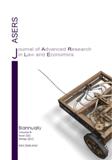THE IMPACT OF WORSHIP ON INDIVIDUAL’S WELL-BEING
THE IMPACT OF WORSHIP ON INDIVIDUAL’S WELL-BEING
Author(s): Ashar Awan, Fozia Munir, Syed Nisar Hussain HamdaniSubject(s): Economy
Published by: ASERS Publishing
Keywords: worship; happiness; well-being; religion; religiosity; divine economics;
Summary/Abstract: Purpose: Individual well-being has been the focus of analysis among rapidly rising number of economists in the world. Especially, after the ground breaking work of Layard (2005), a variety of factors affecting well-being has been identified in the literature. However, despite its prime importance, religion could not get the proper importance in such an analysis. It has been observed by some critics that, for example, GDP ignores the environmental cost a country is bearing, wealth variations between poor and rich, factors impacting the well-being of the individuals like mental health, social relations and personal safety (Anheier and Stares 2002; Fleurbaey 2009, Michaelson et al. 2009). Subjective well-being is the level of satisfaction from an individual’s life, environment, relationships and other economic and social matters. Researchers found a number of factors which affect well-being and which are therefore included in the economic and environmental judgment. There are also many non-material factors which can affect well-being, presented in McAllister (2005), including personal relationships (Helliwell and Putnam 2004); social and community relationships (Keyes 1998), employment (Layard 2005); and political regimes (Donovan and Halpern 2003), contextual and situational factors, demographic factors; (iv) institutional factors, (Hoorn 2007). Some studies included religious factors as the determinant of well-being (Hewitt Source 1994, Chang 2003). There have been studies (Iannaccone 1990, 1998, and 2000), (Finke and Stark 1992), (Finke 2003), and (Hamdani 2006) that brought the attention of other researchers towards multi-disciplinary research. The emerging importance to study religion has convinced the social scientists to observe how religion affects different aspects of human behaviour. According to Iannnaccone, (1998) more than 200 papers have been published on religious and the economic impact of religion. Approach/methodology/design: The paper examines weather religiosity, per capita consumption and education index can affect well-being. Using data from the Divine Economic Survey (2000), the study is an application of Divine Economics. Divine economics is a term associated with the study of economics and religion in each other's perspective. Divine economic survey’s 2000 data set on 302 household is used in this study. In this survey, prayer index is used which identifies number of obligatory prayers respondent performs daily. The Divine Economic dataset was said to be the largest in the world on religion and economics (Freeman, London School of Economics, 200413). Researchers such as G. Sison et al. used Ordered Logit Model as their dependent variable life satisfaction – it is an index which takes values from 1 to 10. Our Well-being index takes values from zero to 100; i.e. it is a sum of responses against a variety of questions. To check the impact of religion we used OLS technique and descriptive analysis for the study.
Journal: Journal of Advanced Research in Law and Economics (JARLE)
- Issue Year: III/2012
- Issue No: 06
- Page Range: 21-30
- Page Count: 10
- Language: English
- Content File-PDF

